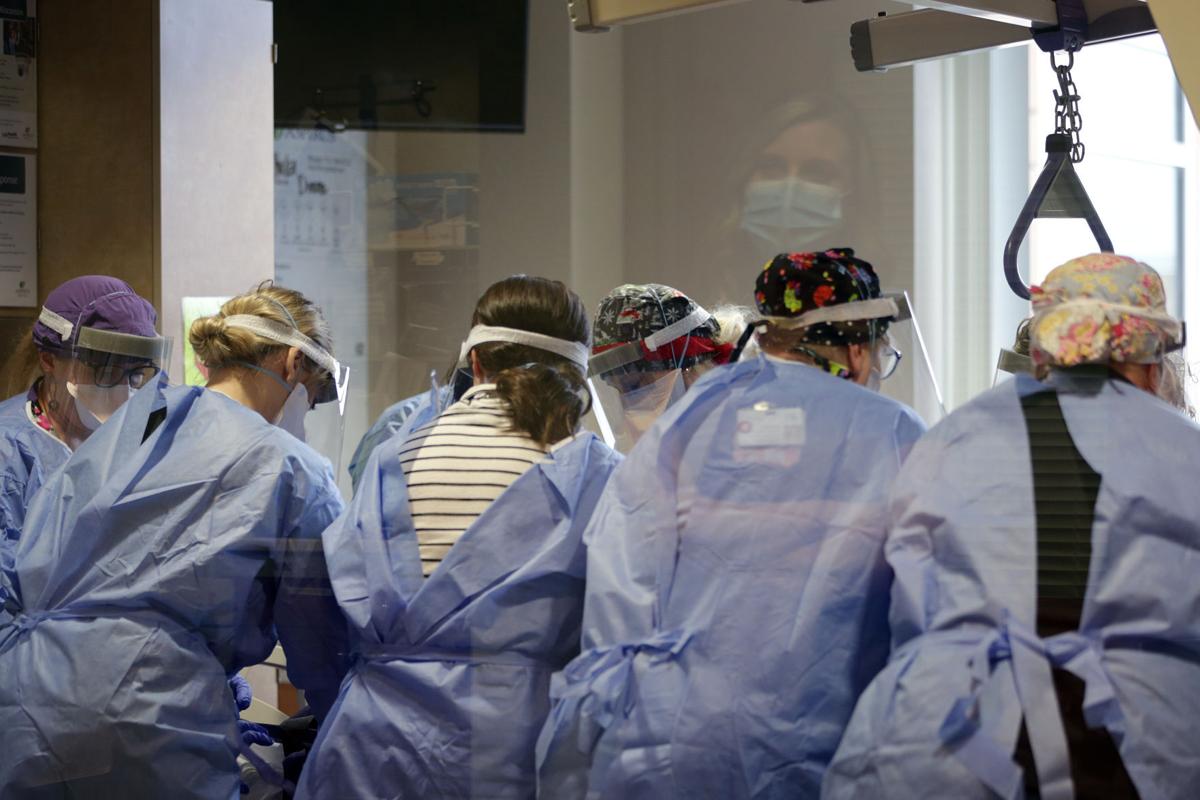
Nurses and other staff at Aspirus Medford Hospital prepare to rotate a ventilated, unvaccinated COVID-19 patient. The hospital didn't treat ventilated patients until September, when it became hard to transfer them elsewhere because of the delta variant surge.
As a COVID-19 surge leads some Wisconsin hospitals to cancel procedures and turn away patients, health officials on Monday urged residents to get vaccinated, wear masks indoors and keep holiday gatherings small to prevent cases of the new omicron variant from overwhelming already strained facilities.
Dane County extended its mask mandate until February, with the county’s weekly COVID-19 case rate nearly three times that from early November and coronavirus-related hospitalizations at the highest level this year.
“Our health care organizations have been pushed to the breaking point, and it is quite possible that omicron will push us beyond the breaking point,” said Dr. William Melms, chief medical officer of the Marshfield Clinic Health System, which has discontinued elective surgeries requiring inpatient beds and is turning away 100 referrals a week. “Something’s got to give.”
The hospital in Medford, like others, is feeling the strain, with no end in sight.
With 96% of intensive care beds and 98% of intermediate care beds already in use, and hospitals and nursing homes struggling to find nurses and other staff to care for patients, state Department of Health Services Secretary Karen Timberlake pleaded for unvaccinated people to get shots and for everyone to do their part to stop the spread of the coronavirus.
“We are at another critical moment in this pandemic,” Timberlake said. “What each of us chooses to do in the next few weeks really matters. ... Whatever you thought you were doing to help make COVID-19 better, we need everyone to be doing a little bit more.”
The state has placed hundreds of reserve staff at dozens of hospitals and nursing homes, and has requested federal assistance for additional staffing that could come soon, Timberlake said.
Wisconsin has found 19 cases of the omicron variant — including some in Dane County — which is believed to be significantly more contagious than previous strains, including delta, and appears to require booster doses of vaccine for adequate protection. Early data indicate omicron may cause less severe disease in individuals, but its rapid spread could still increase hospitalizations overall, especially among the unvaccinated, health officials say.
“Our expectation is that it’s going to be circulating at high levels very shortly if it’s not already,” said Dr. Ryan Westergaard, a chief medical officer with the state health department. “We’re in a very dangerous place.”
Mandate extended
Public Health Madison and Dane County extended its mask mandate to Feb. 1 after last month saying the requirement would continue until Jan. 3. The order requires masks for everyone age 2 and older in most enclosed spaces open to the public whenever other people are present. The order includes an exception for when all people within an enclosed space are fully vaccinated.
“There continues to be evidence that masks help prevent disease transmission,” said Dr. Jerry Halverson, chair of the county Board of Health. “With delta and omicron circulating, and our hospitals near capacity, it is important for all of us in the community to continue to take this easy action.”
In a public health advisory Monday, the state health department urged everyone who can to get vaccinated, including booster shots for those who are eligible. Everyone age 5 and older is eligible for the vaccine, while boosters are available for everyone age 16 and older.
COVID-19 vaccines remain highly effective at preventing severe disease and death from the delta variant, which still accounts for the vast majority of cases, the memo said. Fully boosted people are protected against serious illness and hospitalization from omicron, which is starting to circulate more widely.
Face masks should be worn indoors when with others outside a person’s household, and holiday gatherings should be small, Westergaard said in the advisory. People with COVID-19 symptoms or exposure should get tested.
“It is important for individuals to know whether they have an active COVID-19 infection before gathering,” the advisory said. “Gatherings should also occur in well-ventilated spaces and are always safer outdoors.”
Melms, of Marshfield Clinic, said more than 90% of COVID-19 deaths in the Marshfield system of nine hospitals have been among unvaccinated people. Statewide in November, unvaccinated people were about five times more likely to get COVID-19, 11 times more likely to be hospitalized for it and 12 times more likely to die from the disease than those fully vaccinated, according to the state health department.
COVID-19 activity is critically high in 40 of Wisconsin’s 72 counties and very high in the rest. Statewide, 61.4% of residents have received at least one dose of vaccine and 57.8% are fully vaccinated.
As of Monday, 1,660 patients were hospitalized with COVID-19, including 424 in intensive care, according to the Wisconsin Hospital Association. Dane County had 130 patients hospitalized with COVID-19, for a seven-day daily average of 130, the highest average this year.
President Joe Biden is scheduled to address the country Tuesday about the pandemic, including the omicron variant.
State Journal reporter Emily Hamer contributed to this report.
Fave 5: Reporter David Wahlberg picks his top stories of 2021
COVID-19 dominated my year as the State Journal’s health reporter, except for June and July, when it seemed we might overcome it. Vaccinations and variants were new angles this year. I also covered continuing deaths from the pandemic and challenges for health care workers.
During the summer dip in coronavirus activity, I wrote about a little-known hereditary disorder tied to several cancers, for which Fitchburg-based Promega Corp. has developed related testing.
This fall, I spent much of my time working on a three-day series about newborn screening, focusing on how the testing varies among states. If you were born since the mid-1960s or had a child since then, you’ve almost certainly taken part in this screening, which looks for rare diseases for which prompt treatment can prevent death or disability.
I love transplant stories. Dr. Matt Wolff had quite a backstory to his heart-kidney transplant.
In February, I wrote six more vignettes about people who died from COVID-19.
Little-known Lynch syndrome is more common than BRCA mutations for breast cancer.
In September, I visited the COVID-19 unit at St. Mary's. These dedicated workers are tired.
Health - Latest - Google News
December 21, 2021 at 08:35AM
https://ift.tt/3yNhIwL
COVID-19 surge could further overwhelm health care system, Wisconsin officials say - Madison.com
Health - Latest - Google News
https://ift.tt/2zrj9Ud



No comments:
Post a Comment